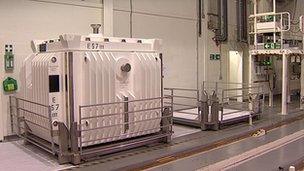Nuclear material moved by train from Scotland to England
- Published
Moving the material by rail has been opposed by campaigners
The first of 90 rail shipments of nuclear material from Dounreay in Caithness to Sellafield in Cumbria was made overnight.
The journey was understood to have been made under armed escort.
Forty-four tonnes of breeder material in total will be transported by train to Sellafield for reprocessing.
At an estimated cost of £60m, the Nuclear Decommissioning Authority (NDA) said it was a cheaper option than trying to deal with it at Dounreay.
Breeder is classed as material and not as fuel or waste, by NDA.
The material comprises cylinders of uranium metal, about 150mm long and 35mm in diameter known as "pucks".
Fourteen pucks are stacked end-to-end in a stainless steel tube. The tubes were positioned vertically to form an outer ring around experimental Dounreay Fast Reactor (DFR).
The material is being transported about 400 miles (643.7km) in containers called flasks.

The breeder material is being transported in containers called flasks
The NDA held a public consultation on a number of options for what to do with Dounreay's breeder material.
In their responses, campaign group Nuclear Free Local Authorities (NFLA) and Shetland Islands Council said they wanted it to be stored at the Caithness site.
NFLA also raised concerns about it being transported an under armed escort.
The NDA declined to detail security plans, but said earlier this year that safety would be key.
Alex Anderson, deputy project director for fuels and waste at Dounreay, said the site was working closely with Sellafield and contractors.
He added: "Our priority throughout has been to move this material in a way that protects the public and the environment from harm at all times.
"We have worked closely with regulators to ensure compliance with stringent national and international safety standards governing the transport of radioactive material."
The authority has also proposed moving other material called "exotics", which includes fuel containing highly-enriched uranium, from Dounreay to Sellafield at a later date.
The NDA has said it could be moved in up to 60 journeys over six years starting sometime in 2014 or 2015.
- Published25 May 2012
- Published24 May 2012
- Published20 March 2012
- Published12 March 2012
- Published7 February 2012
- Published19 January 2012
- Published13 January 2012
- Published8 July 2011